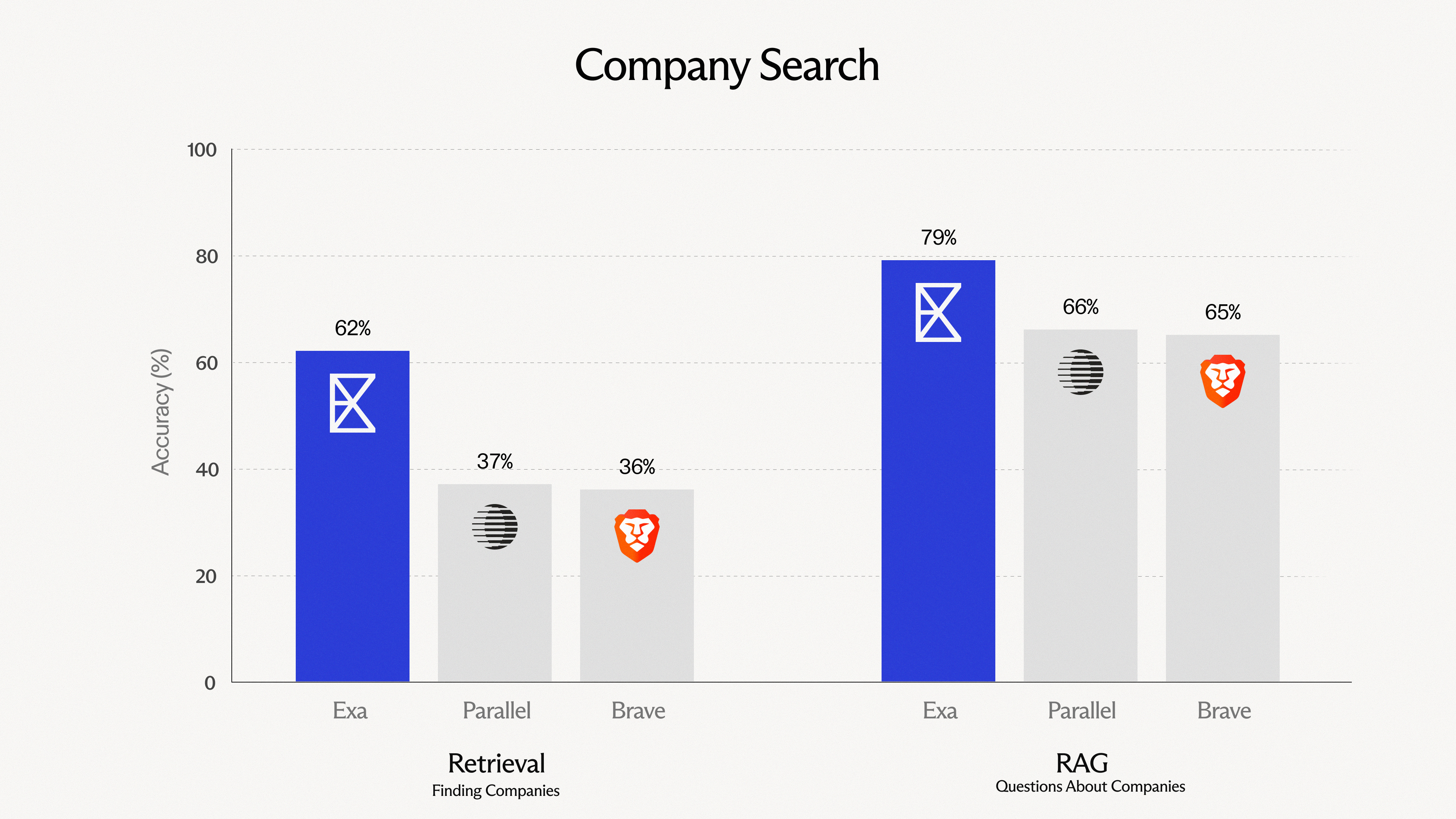Building Search for the Post-ChatGPT World

Our information ecosystem is broken, and the best way to fix it is to combine LLMs with high quality content from the Internet. If you want to skip to us shilling our API, scroll to the bottom.
Our decaying information ecosystem
We started Exa because we were frustrated with the state of the Internet. Slowly but steadily, that beautiful place where you could find the best information about anything has become warped by the competitive monetization of your attention.
In our opinion, nowhere is this clearer than in the deterioration of Google search. An entire industry – search engine optimization – is dedicated to the science of ranking higher in Google results in order to monetize your attention. The effect is that even a query as simple as "eggplant parmesan recipe" results in a ferocious competition among websites not to have the best content but to rank higher in Google's search results.
Our endeavour
At Exa, we wanted to figure out how to make search feel magical again, and developments like GPT3 gave us confidence that it could be done using the power of large language models. We raised a seed round, bought a GPU cluster, and set off to figure out how to improve search. Our goal was (and still is) to make Internet search feel like you're being personally guided through the grand total of human knowledge.
After over a year of experimenting with different architectures and training datasets, we arrived at a completely different way of searching the internet. The key insight was that the way people talk about a link is a great indicator of both the link's content and its quality. For example, someone might post about a great article they read like this:
Found an amazing article I read about the history of Rome's architecture: [LINK]
We trained a neural network to take text like this and predict the link that comes afterward. The end result is a totally different way to search the internet – search as if you're about to share the link you want. While a little unintuitive at first, searching this way can return extremely high quality results. Some ways you can search:
- Search with descriptors or vibes
- Search only for the type of entity that you want
- Find content that Google simply doesn't surface well, maybe because keywords aren't the right tool or maybe just because Google doesn't care about returning good results for that type of content.
- Search by a link itself, finding links most similar to it.
If you want, you can try it below or at https://search.exa.ai/search.
AI agent startups
Adept: Useful General Intelligence
https://www.adept.ai/
We believe that AI systems should be built with users at the center — where machines work together with people in the driver's seat: discovering new solutions, enabling more informed decisions, and giving us more time for the work we love.
Beam - Generative AI Agents to 2x Productivity
https://www.beam.ai/
First of all: Please get well soon and make sure you get the rest you need.
Unakin
https://www.unakin.ai/
Our agents await your command, ready to build the parts of your game you don't want to.
AO Labs | AI you train like animals
https://www.aolabs.ai/
We'd love to hear from you.
Mindverse AI
https://www.mindverse.ai/
MindOS is tailor-made for businesses to automate the drudgery of customer service, sales, and marketing with next-generation NLP and LLM technologies.
Fixie.ai â Build on LLMs
https://www.fixie.ai/
We've got you.
Home - Norn Global Advisory
https://norn.ai/
It demonstrates human-like emotional responses for the first time.
Maya :: Programs that build other programs.
https://mayalabs.io/
How much new music, art, writing, science and enterprise sees the light of day - every day?
Arena · Autopilot for Business Decisions
https://www.arena-ai.com/
arm Make autonomous decisions in the real world, at the right time Autonomy OS integrates with your existing enterprise systems (or builds new ones) to make end-to-end integration easy.
AI.XYZ
https://www.ai.xyz/
"Like ChatGPT, but way more proactive and useful because it's designed by me, for only me"
And then ChatGPT happened
The craziest thing happened just a few weeks after we put Exa into the wild - ChatGPT was released. Overnight, the biggest revolution in our information ecosystem since the Internet was thrust into the world. Then, just a few months later, GPT4 rocked the world again.
Since GPT's release, the early AI adopters among us have experienced a dramatic shift in how we consume information. Whether the topic is programming, history, or your love life, you can often get the answer you're looking for by simply asking ChatGPT. This alien intelligence is destabilizing the internet, and when the dust settles the internet will be a very different place. The fall of Stack Overflow, the reddit API fiasco, and the data lawsuits are just some of the early secondary effects.
But LLMs have limitations
For a while, we were pretty taken aback by these developments. Why does search matter if you can just ask an intelligent agent for a direct answer? We worried that making search feel magical wasn't important anymore.
But as the LLM ecosystem has developed, we've seen that despite their high intelligence and reasoning abilities, LLMs suffer from serious deficiencies.
- Hallucination – LLMs, even GPT4, often output incorrect or fake information.
- Stale knowledge – LLMs have training cutoff dates. Their weights aren't updated continuously, so they can't know about the latest and greatest developments in the world.
- Limited knowledge capacity – LLMs can't memorize the entire internet. Even if an LLM knows the plot of "The Great Gatsby", it doesn't remember all the words. It's not designed to be a database.
To fix these problems, LLMs need to query the external world. They need to search and consume content on the Internet. This insight led us to a new hypothesis about the future of search:
LLMs will soon perform more searches than humans
What a search engine for LLMs could look like
The ability for LLMs to find high quality external information will become increasingly important as LLMs become a key human-computer interface. Paired with a good search engine, LLMs can give you the answer to any type of question you have, provided the LLM is sufficiently intelligent and the search engine sufficiently powerful.
Well what would such a search engine look like?
We'll probably write another blog post about this topic, but a couple things:
- Quality over clickbait. LLMs prefer to ingest information-dense content that they can use to answer someone's question in the most informed way. For instance, a search engine designed for LLMs shouldn't return listicles of entity X because they'd probably be better off researching entities and creating lists themselves.
- High precision. LLMs are very sensitive to the quality of the content they ingest. If the search engine returns low quality or irrelevant content, the LLM will output low quality or irrelevant answers. A search engine for LLMs needs to be able to find the exact information the LLM needs, which is often highly specific. It can't just return a list of links related to the query; it needs to return the links that best answer the query.
- LLM-native queries. LLMs don't think in keywords, they think in concepts. A search engine for LLMs should be able to understand queries that are long, complex, and nuanced – essentially, queries that are themselves LLM outputs. For example, the LLM might ask a search engine to find "companies working on AI safety that have raised more than $10M and have a blog post about their safety philosophy."
- Content retrieval. Often, LLMs will want the full content of a webpage, not just the link. So the search engine should be able to retrieve the full content of any webpage on the internet.
- Low latency. LLMs are often used in interactive applications, so the search engine needs to be fast. This is particularly challenging because of the other requirements - high precision, LLM-native queries, and content retrieval are all computationally expensive.
- Content moderation. Like humans, LLMs can be negatively influenced by bad content. A search engine for LLMs should have robust content moderation to filter out harmful, biased, or otherwise problematic content.
This is why we're building the Exa API
We realized that the search engine we had built for humans was also the search engine that LLMs need. We believe Exa is the best search engine for LLMs on the market today.
from exa_py import Exa
exa = Exa("your_api_key")
results = exa.search("AI agent startups",use_autoprompt=True).get_contents()We're seeing a lot of companies building on top of Exa to power their LLM applications. If you're building an LLM application that needs to access the internet, we'd love to hear from you. You can sign up for an API key at https://exa.ai.
The information ecosystem is changing rapidly, and we're excited to be a part of it. We believe that the future of information is LLMs + Exa, and we're excited to see what you build with it.

